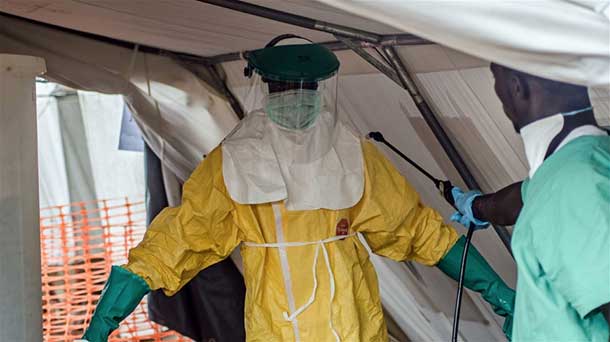

Growing Cases of Ebola Virus
TORONTO – HEALTH – Eric Hoskins, Minister of Health and Long-Term Care, issued the following statement on a patient being tested for Ebola Virus Disease in Ontario:
“The health and safety of all Ontarians is my top priority. I have been closely monitoring the situation in West Africa since this outbreak began and I know that health professionals in Ontario have been alert to possible cases of Ebola in patients who have been traveling in affected regions.
I am aware that we are currently testing a patient who recently travelled from West Africa. Initial signs and symptoms of Ebola are similar to many more common diseases. One such disease relevant to African travel is malaria. There are currently no confirmed cases of Ebola in Ontario.
I am in close contact with our Chief Medical Officer of Health, and we are working with our health system partners to monitor and manage the situation. From the beginning of the outbreak in West Africa we have taken steps to ensure our health system is prepared should a returning traveler be suspected of having the disease. With the experience and lessons learned from the SARS epidemic, our hospitals have sophisticated infection control systems and procedures to protect health providers, patients, and all Ontarians, and are fully equipped to deal with any potential cases of Ebola.
As Minister of Health and Long-Term Care, and as a public health doctor with many years’ experience working with infectious diseases in Africa, I am confident that Ontario is prepared and ready to contain and treat any potential case of Ebola in our province.
I will continue to monitor the situation closely and will provide regular updates.”
Ebola Outbreak Generates Fear
There are Army roadblocks in Liberia, to stop Ebola from spreading.
With the death toll approaching one thousand across West Africa, the World health Organization says the Ebola epidemic is now an international public emergency. The W.H.O.’s Director General Maregaret Chan states, “The committee’s decision was unanimous. Its advice to me acknowledges the serious and unusual nature of the outbreak and the potential for further international spread.”
The countries most seriously affected, Liberia, Sierra Leone and Guinea, are struggling to contain the epidemic.
Quarantines are in place in all three countries.
Still, Ebola continues to spread. But the W.H.O. says — with international vigilance — the crisis can be overcome. Head of Health Security Keiji Fukuda says patient isolation to prevent transmission, is crucial.
United Nations Issues Alert
The United Nations World Health Organization (WHO) today declared the current Ebola outbreak in West Africa an international public health emergency, saying: “our collective health security” depends on urgent support for containment in the affected countries.
“I am declaring the current outbreak of the Ebola a public health emergency of international concern,” WHO Director-General Dr. Margaret Chan told a press conference in Geneva, endorsing the unanimous recommendation made by Emergency Committee of International Experts on the current Ebola outbreak in Guinea, Liberia, and Sierra Leone, and which has now spread to Nigeria.
“This is the largest, most severe, most complex outbreak in the nearly four decades history of this disease,” said Dr. Chan who also endorsed the temporary measures to reduce the spread of Ebola agreed upon by the Executive Committee and issues as a statement.
Regarding the issue of temporary travel bans, the Committee declared: “There should be no general ban on international travel or trade” but recommended restrictions regarding the Ebola-affected travelers.
As of 4 August 2014, the cumulative number of cases attributed to Ebola in the four countries stands at 1, 711, including 932 deaths.
WHO said the disease if affecting only a small part of the African continent, but the head of the UN health agency said there is “a clear call for international solidarity” to boost the capacity if the countries currently affected.
“Our collective health security depends on support for containment in support in these countries,” Dr. Chan said.
For example, the Executive Committee said: “It is essential that a strong supply pipeline be established to ensure that sufficient medical commodities, especially personal protective equipment (PPE), are available to those who appropriately need them, including health care workers, laboratory technicians, cleaning staff, burial personnel and others that may come in contact with infected persons or contaminated materials.”
Dr. Keiji Fukuda, WHO Assistant Director-General for Health Security who joined Dr. Chan at the press conference noted that fear and misinformation were contributing to the current outbreak, and reassured his audience, saying that Ebola can be contained.
Ebola “is not mysterious,” Dr. Fukuda said. “This is an infectious disease that can be contained.”
The statement by the Emergency Committee said: “It was the unanimous view of the Committee that the conditions for a Public Health Emergency of International Concern (PHEIC) have been met.”
Among its recommendations was that: “There should be no international travel of Ebola contacts or cases, unless the travel is part of an appropriate medical evacuation” and outlined specific ways to minimize the risk of international spread of the Ebola virus disease as well as advice to currently unaffected countries and those bordering the affected states.
Based on the advice of the Executive Committee, “the Director-General accepted the Committee’s assessment and on 8 August 2014 declared the Ebola outbreak in West Africa a Public Health Emergency of International Concern (PHEIC).”
WHO has scheduled to convene a panel of medical ethicists to explore the use of experimental treatment in the ongoing Ebola outbreak in West Africa. Currently, there is no registered medicine or vaccine against the virus, but there are several experimental options under development.
Who has launched a $100 million Ebola Virus Disease Outbreak Response Plan in West Africa.
WHO says the incubation period, or the time interval from infection to onset of symptoms, is from 2 to 21 days. The patients become contagious once they begin to show symptoms. They are not contagious during the incubation period.






